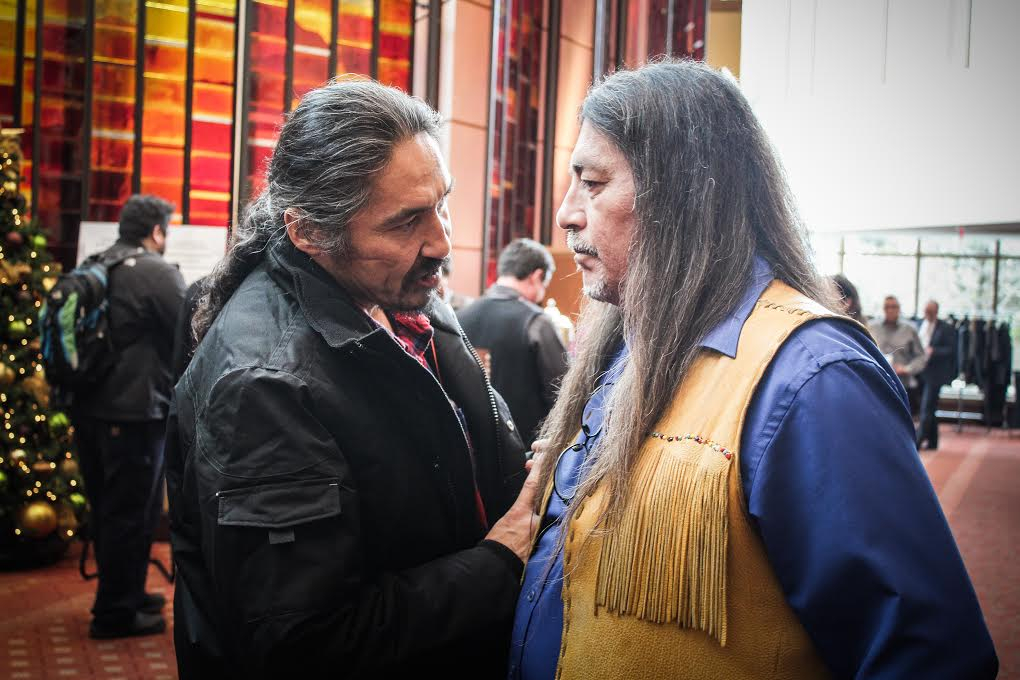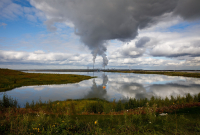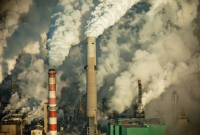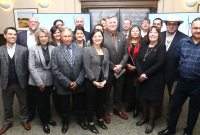Support strong Canadian climate journalism for 2025
The Athabasca Chipewyan First Nation is seeking to block a major oilsands expansion project, adding another Indigenous legal challenge to the region's resource exploitation.
In a filing to the province's energy regulator, the First Nation asked to stop the expansion of Syncrude Canada Ltd's Mildred Lake oilsands operation.
If approved, the expansion would add around 184,000 barrels of oil per day to Mildred Lake's production. Hearings on the matter are to be held by the Alberta Energy Regulator in Fort McMurray from Jan. 22-Feb. 8, 2019.
Chief Allan Adam said that Syncrude's oilsands operations have persisted for 40 years in his nation's territory and have had a deleterious effect on the land and his people. He said that an expansion will only exacerbate these.
Those effects include lower water levels in the Athabasca River and Peace Athabasca Delta, increased water contamination, and destruction of caribou and moose habitat, he said in a statement on Monday.
The Athabasca Chipewyan First Nation has a history of working with oilsands companies and benefiting from jobs and contracts in the region, but it has regularly called for the industry to act more responsibly to reduce its footprint and do more to protect public health.
"We can hardly get a boat through the Delta, migratory birds don’t fly over, the fish are diseased, and our people are sick," he said. "Throughout this whole time Syncrude has not provided any compensation to ACFN for these impacts. Now, Syncrude wants to make their mines even bigger.”
If approved, Syncrude’s site development is scheduled to begin in 2019, with active mining to continue until 2036.
The legal move by the Athabasca Chipewyan First Nation follows word that another First Nation that has partnered with oilsands companies, the Fort McKay First Nation, had challenged its partners in the Athabasca oilsands in order to meaningfully exercise the rights promised in Treaty 8, which was signed in 1899 and is the largest treaty by area in the history of Canada.
Fort McKay First Nation filed suit against the provincial government earlier this month, citing an infringement of Treaty rights and seeking a block on any industrial development in the Moose Lake area.






Comments
Environmental rights and human rights go hand in hand. Can't have one without the other. First Nations in the oil sands area know better than anyone just how wretchedly Big Oil treats the land, the peoples who live on it and how the tax funded subsidies from "Big" government gets sprinkled around to ensure that oil continues to be pumped, continues to send toxins into ground and water, and CO2 into air. All this, while that bottom of the barrel oil hunts for new markets, whines and wails about pipelines, and keeps blackmailing the government.
What a con-game!
"Responsible" oilsands development? "Ethical" oil?
"Since November 2011, water has been delivered to each and every home in Fort McKay after the community realized they had been drinking water with high levels of the carcinogenic chemicals, trihalomethanes and haloacetic acids. Many people complain of rashes and sores from showering in the water.
"Cancer, miscarriage and respiratory illnesses are frequently reported in Fort McKay. Many believe industry is to blame."
• https://thenarwhal.ca/it-devours-our-land/
Chief Jim Boucher, Fort McKay First Nation (Dec 2018): "Fort McKay is fighting for its cultural survival, as one of the largest industrial projects on the planet devours more of our land that has been our home for millennia… We will not stand idly by and let the area be destroyed."
"[Allan Adam, chief of Athabasca Chipewyan First Nation] said his people continue to die from cancer at alarmingly high rates, a fact he blamed on oilsands developments.
"'I am not an environmentalist, I am a land user, I am a provider,' he said. 'Whatever food I'm bringing in from the bush, it is getting our people sick.'"
• www.cbc.ca/news/canada/edmonton/jane-fonda-oilsands-indigenous-justin-t…
Melina Laboucan Massimo, an Indigenous rights activist and environmentalist from the Lubicon Cree Nation in Alberta:
“We can’t drink the water from the streams where the hunters go. We can’t pick medicines and berries — all of the things our people have done for thousands of years, since time immemorial...cultural genocide is what we’re seeing at this point, and it’s not okay.”
• www.nationalobserver.com/2018/05/30/news/chief-bob-chamberlin-says-trud…
Fish suffer lesions and tumours.
"Currently, elders like Bernadette L'Acorde say they can't hunt and fish in the vicinity of Fort MacKay because of concerns about contamination from the neighbouring oilsands sites.
"'We used to hunt and fish. But not anymore. [The land] is all poisoned.'"
• www.cbc.ca/news/canada/edmonton/metis-oilsands-hunt-trap-mckay-metis-1…
Farm families near Peace River were forced from their land by oilsands industry (CHOPS) pollution. (Baytex)
"Unethical Oil: Why Is Canada Killing Wolves and Muzzling Scientists To Protect Tar Sands Interests?
"In the latest and perhaps most astonishing display of the tar sands industry’s attacks on science and our democracy, the government of Alberta has made plans to initiate a large-scale wolf slaughter to provide cover for the destruction wrought by the industrialization of the boreal forest ecosystem.
"In the coming years, an anticipated 6,000 wolves will be gunned down from helicopters above, or killed by poison strychnine bait planted deep in the forest. Biologists and other experts say the cull is misguided, and that their studies have been ignored or suppressed. Worse, they warn that although the government is framing the wolf cull as a temporary measure, it has no foreseeable end.
• www.desmogblog.com/unethical-oil-why-canada-killing-wolves-and-muzzling…
"Responsible" oilsands development? "Ethical" oil?
You decide.
This is a paper written by a student at the Indigenous University in Regina and was shared, with permission by his teacher. Jordan Kos
10 December 2018
Indigenous Studies Student
(shared with permission)
Ethno-Ecocide
The Indigenous peoples viewed the land as a sacred gift from the Creator. Conflict has arisen throughout history between the Indigenous people and the British colonists regarding the exploitation of Canadian natural resources. What was once a sacred land, appropriately cultivated by the Indigenous people with respectful intentions, has turned into a plundered race to captivate all opportunities of wealth by the British. I hadn’t realized until taking this class of the realm of exploitation, cultivation, and transformation of Canadian land brought about by Royal colonists. The change in land prior to British settlement to present day is vast. Through various methods of exploitation gleaned by the Internet, readings of First Nations Contemporary Issues in Canada and A Concise History of Canada’s First Nations, as well as other readings and resources, my critical thinking of the cultivation of Canadian land and natural resources has been greatly impacted.
An ethno-ecocide occurs through the demolition of any environment by man-made realms. This damage can occur through mining, forestry, oil exploration, hunting, water manipulation, pollution or neglect in preserving natural resources through other domains. The problems causing ethno-ecocides negatively affect the ethnic group, especially considering that the Indigenous peoples rely heavily on natural resources to sustain their culture. The aftermath of ecocide can result in serious genetic birth defects, infertility, inability to breast-feed, and diseases such as cancer. An ethno-ecocide policy is a guideline with specific parameters that governments develop and are to be used by businesses and developers whose main objective is to gain profit from natural resources or who disturb the ecosystem. An ethno-ecocide policy is put in place to preserve the land and natural habitant of animals, and so that interference by humans is minimized. Ethno-ecocide policies are far reaching, and the United Nations is working closely with federal Governments to come up with ways to detract from natural ecocide.
After the Europeans colonized Canada, they brought many settlements to the foreign land. In 1839, Britain had declared the Indigenous land to be Crown land. Through this notion, the Indigenous peoples had no political rights. The British Crown had taken advantage of the Indigenous peoples’ sacred land against their will and without consultation or serious negotiation. Once land acquisition was final, the Indigenous peoples had very little control over the cultivation of the land.
This can be seen through the Grand River Navigation Company who created land exploitation projects against the will of the Iroquois who continually suggested that the flooding of the land would destroy the area where generations had fished . Grassy Narrows and Whitedog reserves in Ontario were being polluted with waste disposal by the Reed Paper Company. Methyl-mercury was being dumped into the Wabigoon River system and the water continued to be contaminated for years before the Ojibwa’s concerns were heard. Over-exploitation of Canadian waters can be seen through the Wales exploitation during the 1800s which caused great strife between the British colonists and the Indigenous peoples . British and Scottish settlers had begun a whaling domain in Baffin Island. Because of this new hunting empire, there was a colossal attack on the whale population, affecting the obtainability of sea mammals. This caused great starvation of the Inuvialuit people due to the lack of hunting of other sea creatures. Exploitation of Canadian land can also be seen from the Western Woods Cree people who were situated in Alberta.
The Lubicon Cree band of Treaty Eight in oil-rich Alberta had been in treaty negotiations since 1933, when the federal and provincial governments had neglected to correctly identify Cree land in the treaty. In the 1950s through to the 1970s, the federal government had discovered Uranium deposits as well as oil and gas resources in the area. They were producing petroleum and gas of more than one million dollars per day. The Cree derived no monetary benefit from this substantial oil production. The government was trespassing, cultivating and exploiting the land against the will of the Indigenous peoples. In retaliation, the Band tried to prevent development. Unfortunately, they were unsuccessful and had to stand by and watch as massive amounts of oil pipelines were laid. When one of these pipelines burst in 2011, the land was contaminated. This realm of exploitation of Canadian land suggests the inquiry of how the Indigenous people could live a certain way on the land for generations and then be overwhelmed with big business corporations inhabiting sacred land. The land in Alberta became home to oil industries through over-exploitation of what was once Indigenous sacred land. These are only a few of the multitude of examples of the ways in which ethno-ecocide has affected the Indigenous people.
With ecocide policies in place, but rarely adhered to, the writer quotes, “In opposing the ethno-ecocide policies of Canadian society, they are asserting their right to self-determination, and therefore the liberation of their diverse peoples and nations.” No longer can the Indigenous people stand by and watch businesses and exploration companies destroy the land and natural resources without penalty. The writer implies that Indigenous people need to take matters into their own hands. There is a need for Indigenous self-government so that the Indigenous people have a voice and can stand up to the governments and big businesses. For years, the voices of the Indigenous people have not been heard. It has come to light that “treaty assurances provided little protection” . The government does not stand behind the intent of the treaties, and their word means nothing. The Indigenous people need to confront federal and provincial governments, and insist that ecocide policies be adhered to. Only then can the governments and the Indigenous People work together for the betterment of all.
Before learning about the exploitation of land, first by the colonists and currently by big businesses, I had never thought about the conglomerates and how their exploitation for capital gain had affected the land and resources. When looking at a business or a product in a store, consumers do not see the background deals and unnecessary exploitation of lands that must occur to create a convenient commodity. Society has come to destroy the environment through greedy wants and desires, looking at the benefits of the present but not of the future. It’s time to wake up. It’s time to realize that by supporting these ventures, and buying these products, we are contributing to the destruction of our environment. The benefits that we have come to enjoy also come with a huge price: forsaking current land and resources, while being unaware of future generational struggles.
The Indigenous people are cognisant of the government’s wrong doings. Their voices, unfortunately, are not heard regarding the destruction of the land and the Indigenous culture. The government, as well as those of us who stand by and watch and do nothing, are allowing exploitation of lumber, mining, oil, etc. stripping the land from its natural habitat. One must question what our future environment will look like once all natural resources have been eradicated. Do we have to deplete our land from its rich resources in order to see the destruction we are allowing? My eyes were greatly opened to the high cost of mistreatment of land and resources and my outlook for the future is bleak. We all need to band together and let the government know that we will not tolerate this kind of abuse any further.
Exploitation created by ignorance and racism. This land is not colonists land, indigenous peoples territory is not owned by some British monarchy. Reconciliation starts with humility and an immediate withdrawal of hostility, by all descendants of white Europeans. I will listen and be observant of how a respectful neighbor to indigenous cultures is to move forward to rebuilding trust. I am guilty of white privilege, I will now repay my dues. All Canadians should demand that effective immediately Crown land is to be returned to Indigenous peoples of turtle island.